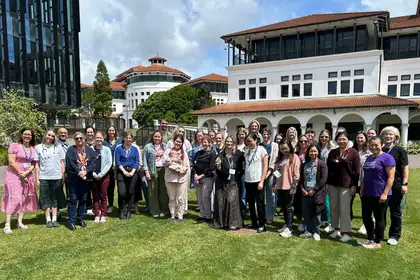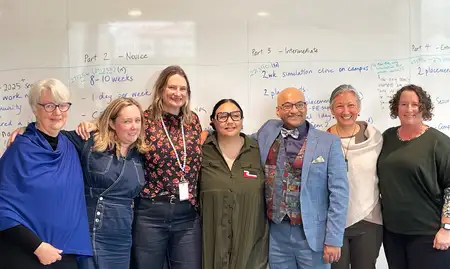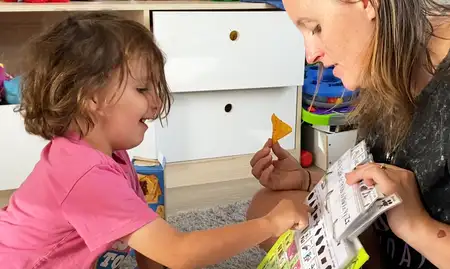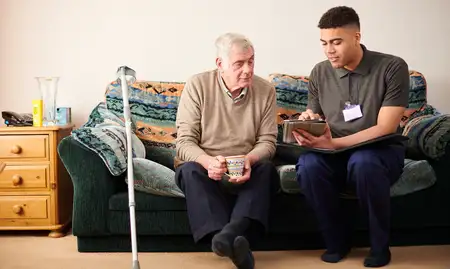
Workshop attendees on the Auckland campus.
Speech-language therapists (SLTs) from across Aotearoa New Zealand, along with international attendees from Hong Kong and Russia, gathered at Te Kunenga ki Pūrehuroa Massey University last month for a two-day workshop focused on infants and children with feeding and swallowing difficulties.
The Cervical Auscultation in Paediatric Dysphagia workshop provided research-based, practical training for SLTs working with young patients experiencing dysphagia, a condition involving difficulty swallowing. This event marked the first training of its kind in New Zealand.
It also provided a crucial opportunity for SLTs in New Zealand to connect with peers and experts in the field.
Cervical auscultation is the use of a stethoscope or microphone to amplify swallowing and breath sounds in order to identify pharyngeal dysphagia and aspiration during a clinical feeding assessment. Although used widely with adults for many years, there has been limited evidence of its use with infants and children.
Massey Paediatric Feeding Specialist Emily Jones and SLT Clinical Centre Lead for Te Whatu Ora Waitematā Celia Butler organised the course.
“This specialised training is really significant, especially for SLTs in New Zealand, where professionals often work in isolation due to the country’s geographic spread,” Ms Jones says.
The event featured distinguished speakers, including Adjunct Associate Professor Thuy Frakking from Gold Coast University Hospital. Dr Frakking is a clinical researcher with a special interest in paediatric feeding disorders who has attracted more than $1.6 million in funding for translational paediatric research.
Her programme of research focuses on improving and implementing more accurate and accessible assessments for infants and children with feeding disorders and chronic non-complex medical conditions. She is also a prolific author, with her research cited extensively in clinical guidelines.
Associate Professor Kelly Weir, Director of Allied Health Research at the Royal Children’s Hospital, Melbourne, also contributed her expertise. Dr Weir has worked with complex cases involving tracheostomies, cerebral palsy and aspiration-related respiratory diseases.
The workshop was held against the backdrop of growing concern regarding infants and children living in remote areas having to travel significant distances to access SLT services at major centres. Having cervical auscultation as a tool for SLTs not only provides them with more evidence to refer infants for instrumental assessment, but also enables them to make management decisions to help reduce risk and improve swallow safety.
Feeding and swallowing issues are becoming more prevalent around the globe. In the United States, studies show that between one in 23 and one in 37 children under five are affected by paediatric feeding disorders, with the rate increasing to one in three or one in five for children with health conditions or developmental delays.
With 35 participants in attendance, the workshop marked an important milestone in strengthening local expertise and fostering global collaboration among professionals in the area of paediatric care.
Isabel Li travelled from Hong Kong to attend the workshop. She says the workshop was incredibly useful.
“I am thrilled there’s such an effective way to help the little ones who struggling every day. It is amazing how adding this auscultation can give us a fuller picture of the overall swallowing issues.”
Mt Richmond Specialist School SLT Cynthis Ho was also in attendance and says she appreciated the opportunity to learn from experts.
“The course provided extensive theoretical content, which Kelly and Thuy delivered in an approachable and engaging way. I especially appreciated the hands-on practice in distinguishing normal and abnormal swallowing and respiratory sounds in infants and children alongside fellow Speech-Language Therapist colleagues. Additionally, Thuy and Kelly presented the latest evidence on Paediatric Cervical Auscultation, offering invaluable insights to support evidence-based practice and effectively communicate this information to whānau. I am excited to apply this skill to support my students’ feeding and swallowing experiences.”
Hauora Tairawhiti Paediatric SLT Maria Camero says she found the workshop very informative.
“It is another tool that I have added in my kete especially coming from an area where we cannot offer VFSS/FEES for the paediatric population. The workshop was research based. We had a lot of time to practice and listen with our stethoscopes. The presenters had a bank of both audio and video samples that helped the participants listen for the components of a swallow. In my opinion, training on cervical auscultation should be considered as part of the curriculum for future SLTs.”
Related news
Innovative Speech Language Therapy programme undergoes professional accreditation site visit
Te Kunenga ki Pūrehuroa Massey University’s Speech Language Therapy programme has gone through a professional accreditation site visit by the New Zealand Speech-language Therapists’ Association.

Doctoral research has amazing communication outcomes for children
When Speech-Language Therapist Sam Brydon embarked on her doctoral research coaching parents to support their non-speaking children to communicate, she had no idea how successful it would be.

Speech Language Therapy programme now more widely accessible
Te Kunenga ki Pūrehuroa Massey University is shifting its training programme online from 2024 so it becomes accessible to all students no matter where they live.
